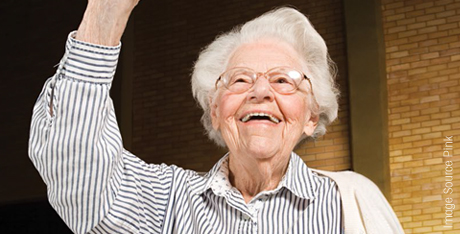“N 37,” I call loudly.
“BINGO!” Arlene shouts, her eyes so alight with the thrill of victory that I barely notice the oxygen tube strung haphazardly across her face.
“Great job, Arlene,” I say, genuinely sharing her joy. “But, let’s keep going. We’re playing blackout, so we want to cover the whole card, all the numbers.”
Ten of us sit around a large wooden dining table at the assisted living home where my mom lives now. At 81, Mom is one of the youngest of the 15 residents. She suffers from Lewy Body Dementia, a form of dementia with characteristics of both Alzheimer’s and Parkinson’s. At the time she was diagnosed, she was living alone, still driving herself to church and the grocery store. That was just over a year ago.
“I 22,” I call.
“BINGO!” Arlene claps her tissue paper hands, and the rest of us join in, celebrating her new Bingo.
Here, where the fire of dementia burns white hot, these women live fully in the present moment, deliriously happy with victory in any form. The flame consumes their newest, freshest memories first, like the memory of what was said one sentence ago, but leaves intact the oldest remembrances from childhood, like what the letter “I” looks like and the number “22,” and how, when they’re strung together in a line, they form a Bingo.
Last year, staying with Mom in her townhouse, I watched with an aching heart every morning as she got her own breakfast, relearning where everything was in her own kitchen. And then, because she couldn’t remember where they were in the first place, she put them away in different places, unintentionally giving me an object lesson in what it was like not knowing.
Mom watched the same channel all day every day, because she couldn’t remember how to use the remote.
I had tried back then to start chatty conversations with her about things that happened in my childhood, but, most often, she couldn’t remember them. Mom, the storybook of my life, had blank pages. It was a lonely realization that it was now up to me to remember how old I was when I took my first steps and why I was hospitalized at five years old.
Back then, when Mom was living alone, it was hard to find any sweetness to counterbalance the sad reality of memory loss. My sister and I worried constantly that Mom would try to cook and forget that the stove was on, that she would go for a walk and lose her way home, or fall and break her hip, which is exactly what happened two months ago, a fall that ultimately landed her here in assisted living where I am visiting for the first time.
“N 43,” I call.
“BINGO!” shouts Arlene.
At lunch Arlene looked across the table at me helping Mom and said wistfully, “I have two children, but they never come to visit me.”
“I like you,” she said, smiling with the innocence of a 5-year-old and moving carefree into her next moment.
As I plummeted into the tragic sadness of this news, I remembered that Mom had told me just this morning that her sister had never visited her. On the contrary, I knew that my aunt had come by several times, yet Mom has no memory of her sister’s visits. For Mom, in this moment, the notion that her sister never visits is utter truth.
And for Arlene, even if the seat beside her is still warm from her daughter’s visit, this moment’s sad truth is that her children never come to visit.
“I’ll come visit you, Arlene,” I said, my voice faltering with emotion.
“I like you,” she said, smiling with the innocence of a 5-year-old and moving carefree into her next moment, taking childlike pleasure in a small bowl of Neapolitan ice cream, completely liberated of all that had gone before. I staggered into my next moment, dragging the weight of memory and the heavy burden of liking Arlene too.
Watching her savor her ice cream, I saw I was now alone, no longer liked by Arlene, her memory of me consumed by the fire.
After lunch, at the dining-room-turned-Bingo parlor, the youngest resident sits next to me.
Nadine is tiny and spry, impeccably dressed, with an alert demeanor that made me think she was a visitor as she enthusiastically worked two Bingo cards and helped 97-year-old Gracie next to her. “I never win at Bingo,” Nadine sighs, shaking her head despondently.
Watching her savor her ice cream, I saw I was now alone, no longer liked by Arlene, her memory of me consumed by the fire.
Without thinking, I blurt out, “But Nadine, you just won two games in a row!”
I am horrified at my own lack of discretion, sure that I’ve embarrassed her.
“Oh, really?” she says, shock and then joy filling her face. “Oh, good!”
With Mom safe here, with others to watch over her, to cook, do laundry and administer meds, I see dementia with new eyes. Mom, who used to fret about the past and worry about the future, now lives fully in the moment, the burdens of her past now gone, forgotten. She has no concern about a future that doesn’t exist, because she can’t remember to envision it and then to worry about it. Her disease, one I had always seen as tragic and debilitating, had freed her from her past and her future.
I turn the crank on the cranky metal cage, and Bingo balls drop, sometimes retained as they are supposed to be in the metal slide, sometimes flying across the table and onto the floor, sending me scrambling after them.
“B 6,” I call over a loud, persistent beeper alerting the staff that someone has pushed the alarm button that all the residents wear around their necks.
“BINGO!” Ginny calls out in pure delight, and we all clap.
“That’s so awesome, Ginny, but we’re playing blackout, so let’s keep going. Cover the whole card.”
I am living so completely in the moment, concentrating on the most fulfilling job I’ve ever had, so free of my sardonic self, that I have completely missed the tragic irony of playing blackout with eight women caught in the ultimate game of blackout.
“What was the last number?” Cora interrupts me in a gravelly, expressionless voice.
Our eyes meet. “I have no idea,” I say.
Cora is fine with that as she steps lightly into her fresh now.
Memory loss is a sweet gift, wrapped in bitter paper for those of us still burdened with life beyond “now.” We don’t know what the future holds for Mom or for us. I struggle to follow her lead, just let the future be, toss away the paper, and treasure the gift. I focus on Mom’s carefree face, turn the noisy crank, and call out another number.
“BINGO!” Ginny calls.
With a winner finally declared in the blackout round, there are only six balls left in my metal cage. I take them out and place them in the master Bingo tray to see if we are playing with a full set. As I feared, we are not. One ball is missing. G 50. G 50 has gone missing.
With much fanfare, all the extra-large, Easy-Read cards are cleared of their poker chips. Everyone who can remember reminds everyone who can’t to put a chip on the FREE spot in the middle of the cards. I scoop up all the balls but G 50 and put them back in the cage to start a new game.
“G 50,” I call out in a heartfelt effort to make up for all that has gone missing.



